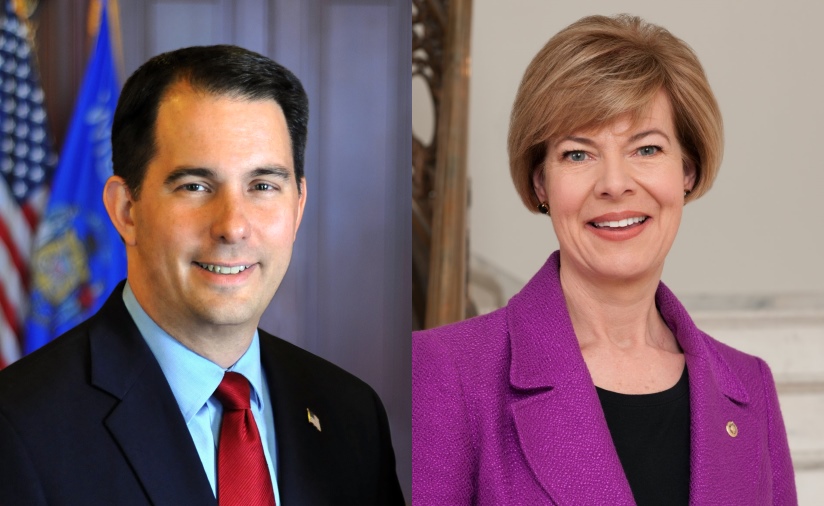Baldwin, Walker Lead in Latest MU Poll
Baldwin up 10% over Vukmir, Walker up by just 1% over Evers.
The race for governor tightened in the latest poll by Marquette University Law School with Republican Gov. Scott Walker leading Democratic challenger Tony Evers by 1 percentage point.
Meanwhile, the race for U.S. Senate remained more lopsided, with Democratic U.S. Sen. Tammy Baldwin leading Republican state Sen. Leah Vukmir by double digits.
Among likely voters, Walker led Evers, 47-46. Another 5 percent supported Libertarian Phil Anderson while just 1 percent said they didn’t know who they’d support.
In the U.S. Senate race, Baldwin led Vukmir 53-43 percent, while 3 percent said they didn’t know.
Marquette pollster Charles Franklin said that could explain why the race shifted from a five-point Evers lead in September to a one-point Walker lead in October. But at the same time, Baldwin’s lead changed only slightly, from 11 points in September to 10 points in the most recent poll.
“Party is something, but it’s not everything,” Franklin said. “It looks like the governor’s race moved but the Senate race did not move, and that’s despite the change in the sample.”
In the race for Wisconsin attorney general, Republican incumbent Brad Schimel led Democratic challenger Josh Kaul by a margin of 47-43 percent. Ten percent said they didn’t know who they would vote for. That’s tighter than in Marquette’s September survey, when Schimel led Kaul, 48-41.
Other findings also suggested a close contest in the race for governor with more of an uphill climb for Vukmir in the race for Senate.
For example, likely voters were more evenly split when it comes to whether they viewed Evers and Walker favorably or unfavorably. Evers’ favorability rating stood at 41-38 while Walker’s stood at 48-49.
But in the race for Senate, Baldwin’s favorability rating stood at 49-42, while Vukmir’s stood at 30-43.
Both Schimel and Kaul had positive approval ratings, but 46 percent of voters didn’t know enough about Schimel to form an opinion and 81 percent didn’t know enough about Kaul.
Marquette’s survey also shed light on some of the issues that have been front and center in the races for governor and U.S. Senate.
When asked about health care, 55 percent favored keeping the Affordable Care Act in place while 44 percent wanted it replaced. An even higher number — 78 percent — say the ACA’s requirement to cover preexisting conditions is very important to them. Democrats have run ads attacking Vukmir and Walker for efforts to overturn the ACA, particularly it’s protections for people with pre-existing conditions.
When asked about roads, it was more of a mixed bag as 64 percent of residents said Wisconsin roads were in fair or poor condition. At the same time, 61 percent said they did not want to pay higher gas taxes or vehicle registration fees.
“People want to pay more taxes for more services, want to pay more taxes for schools. They don’t want to pay more gas tax,” Franklin said.
The findings could explain why Democrats have run ads attacking Walker over road quality in Wisconsin while Walker has run ads attacking Evers for being open to increasing some type of tax or fee to pay for transportation.
Marquette interviewed a total of 1,000 registered voters between Oct. 3-7. That number included 799 likely voters.
The margin of error for questions involving likely voters was plus or minus 3.9 percent. That means Walker’s lead was well within the poll’s margin of error, but Baldwin’s lead was outside of it.
Franklin said Marquette would release one additional poll before Election Day.
Listen to the WPR report here.
Walker, Baldwin Lead In Latest Marquette Poll was originally published by Wisconsin Public Radio.























As usual, the press release doesn’t mention the partisan makeup of the sample. This month’s poll that skews more Republican than past samples. By one measure, the difference is +2 Republican and -4 Democratic, compared to *46* previous statewide polls. By another measure, the difference is +4 Republican and -2 Democratic. In both cases, the skew is 6 points toward Republican. That changes the narrative about the relative strength of the candidates, doesn’t it?
“The partisan makeup of the sample, including those who lean to a party, is 45 percent Republican, 43 percent Democratic and 11 percent independent. The long-term total for the previous 46 statewide Marquette polls, with 40,952 respondents, is 43 percent Republican and 47 percent Democratic, with 9 percent independent. The partisan makeup of the current sample, excluding those who lean to a party, is 31 percent Republican, 29 percent Democratic and 38 percent independent, compared to the long-term totals of 27 percent Republican, 31 percent Democratic and 41 percent independent.”